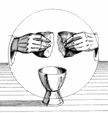 There’s a huge difference between Eucharist and Communion. Eucharist, in its best sense, is an action we do and a means of becoming more than ourselves, while Communion, in its most limited sense, is something we get that we use for our own. At our best, we move outward from Eucharist to love and serve the Lord whom we see most clearly in the poor and outcast; at our worst, we isolate ourselves from the distractions of that world in order to commune with the Lord we cannot see.
There’s a huge difference between Eucharist and Communion. Eucharist, in its best sense, is an action we do and a means of becoming more than ourselves, while Communion, in its most limited sense, is something we get that we use for our own. At our best, we move outward from Eucharist to love and serve the Lord whom we see most clearly in the poor and outcast; at our worst, we isolate ourselves from the distractions of that world in order to commune with the Lord we cannot see.In a 2002 keynote to the Federation of Diocesan Liturgical Commissions, Capuchin priest Edward Foley asserts that one of the key fruits of the Eucharist (the Mass) is a renewal of our call to mission. In other words, the primary effect of our celebrating the Mass should be our strengthened desire to proclaim the Gospel and feed the hungry wherever we go. Fr. Foley believes that, by itself, the act of participating in Holy Communion does not send us out into the world with the same force as our eucharistic celebration. This is because of the sacrificial nature of the Eucharist which Holy Communion, by itself, does not always fully express.
Fr. Foley was comparing primarily the difference between the celebration of the Mass and the distribution of Holy Communion outside of Mass (in weekday Communion services or Sunday celebrations in the absence of a priest). But sometimes, we treat Eucharist as though it were simply a Communion service by minimizing the sacrificial symbols and actions that are integral to the Mass. If our sharing in Holy Communion within Mass is to bear good fruit for the world, we must reconnect it to the broader action of the Eucharist and, as Fr. Foley advocates, strengthen the symbols of sacrifice that call us to mission in the world.
Share the cup
One of the primary sacrificial actions of the Eucharist is the offering and drinking from the Communion cup. When Holy Communion is given outside of Mass, the cup is not offered. When, in Mass, the cup is not offered or many of the faithful refrain from taking it, the sacrificial action is less clear. Yes, drinking the cup by the faithful is optional. But if we are to fully participate in the obligation to serve that marks us as the body of Christ, we must drink the cup, for it teaches us how to pour out ourselves for others. Yes, there is fear of sharing a common cup with strangers. But if we are to face the fear of taking up the cross every day and walking toward Jerusalem, we must take up the cup that Jesus in his own fear did not resist. Eating the Body of Christ shows us who we are to become; drinking the Blood of Christ shows us how to do that, and to do that on Christ’s terms, not ours (Foley, 2002 keynote).
Eat the bread from the altar
Often at a Mass, a large portion of the bread offered to the faithful comes from hosts from the tabernacle and not from the bread consecrated at that altar in that same Mass. This seemingly harmless act disconnects the sacrifice of Christ with the sacrifice of the faithful—the offering of bread and wine they presented as well as the work of their prayer over those same gifts. Using primarily hosts from the tabernacle at Mass discounts their participation and work and makes the Eucharist something we get instead of something we do.
Eucharist demands sacrifice. Make every sharing of Communion within the Eucharistic celebration a full expression of the sacrificial love we are called to give to the world.
No comments:
Post a Comment